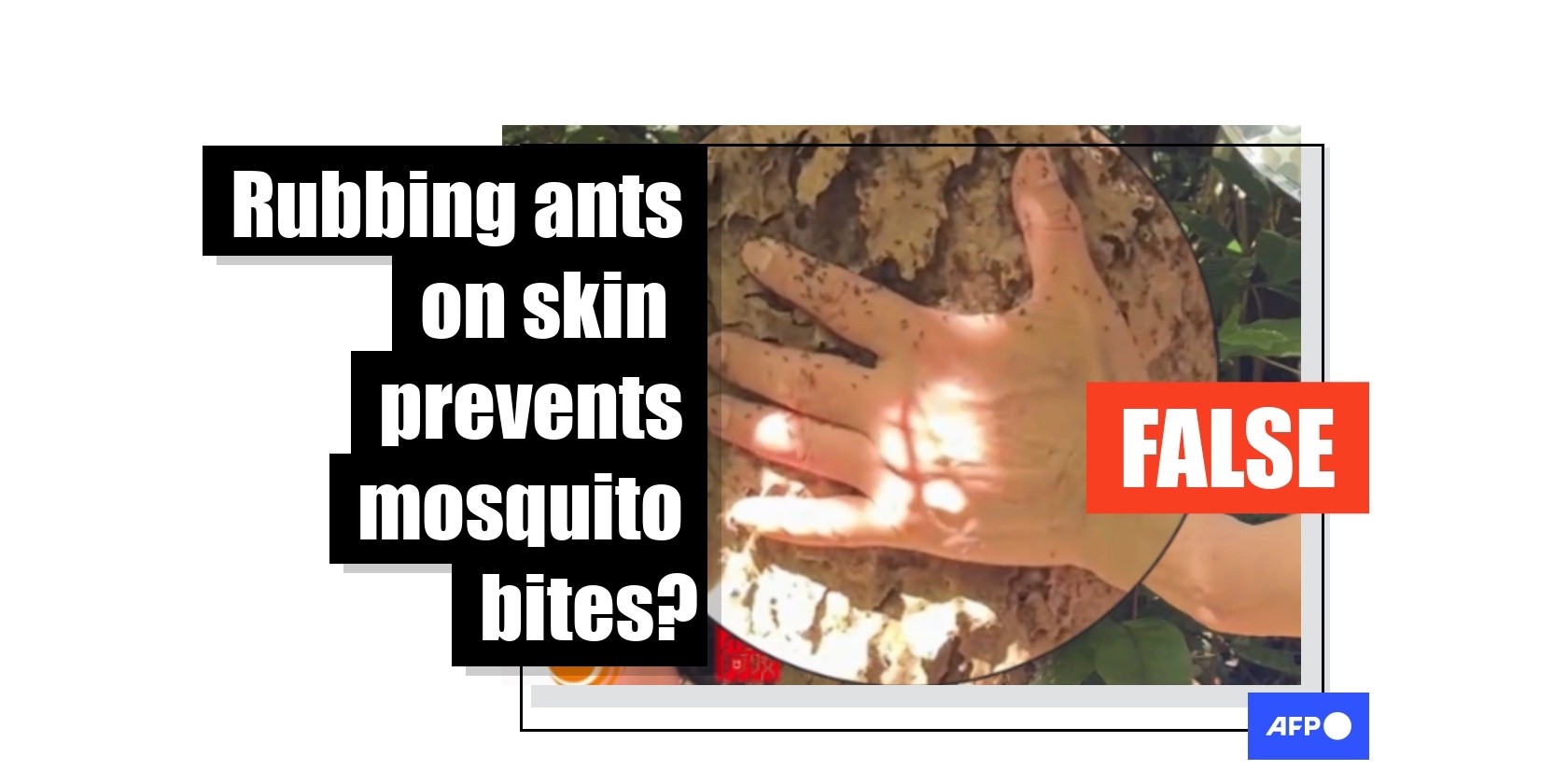
Experts refute claims that ants help repel chikungunya mosquitoes
- Published on August 26, 2025 at 09:57
- 3 min read
- By Anne CHAN, AFP Hong Kong
"Global outbreak of chikungunya fever. Traditional Chinese medicine practitioner teaching you to use ant acids for prevention," reads the text over a video published July 23, 2025 on Instagram.
In the video, a man wearing a red shirt and a hat rubs ants on his bare arms. He says in Mandarin: "Once the ants are on the body, we must immediately kill them, which leaves behind ant acid. When I head up the mountain later, I don't have to worry about mosquito bites."

Chinese broadcaster Phoenix Television and its subsidiary Hong Kong V posted the video on Facebook, YouTube and Douyin, gaining more than 10,000 engagements across platforms (archived link).
In the caption of the Douyin video, the man is identified as Zhao Zhongzhen, a professor emeritus in the School of Chinese Medicine at Hong Kong Baptist University. He appeared as a guest on a Phoenix TV programme that aired August 8 about traditional Chinese medicine (archived links here and here).

Cases of chikungunya fever have surged over the past few months in China, with more than 7,700 people in the southern province of Guangdong infected in early August (archived link).
Chikungunya is caused by a virus that can be passed to humans by infected mosquitoes, with most cases occurring in Africa, Asia and the Americas. Symptoms include fever and joint pain, which may persist for some time but are rarely fatal.
Scientists told AFP that rubbing ants on skin is unlikely to help repel mosquitoes -- and it could cause health problems.
Some research suggests formic acid -- which some ants produce for defence, trail marking and recruitment -- could have a natural repellent effect against ticks (archived link).
But not all ants secrete the acid, and this effect may not apply to mosquitoes (archived link).
"There is no direct scientific evidence to support the claim that rubbing ants on the skin can repel mosquitoes," Hein Min Tun, an associate professor of public health at the Chinese University of Hong Kong, told AFP in an August 21 email (archived link).
Tun said limited scientific evidence suggests that formic acid can ward off ticks and certain ectoparasites, but it does not support its effectiveness against mosquitoes.
Kyndall Braumuller, a research assistant professor at the University of South Carolina, agreed, saying that she has "not read anything about using formic acid as a mosquito repellent". (archived link)
She also warned against using the acid as an insect repellent due to potential health risks.
"Formic acid is an irritant and may be irritating on the skin or in the eyes, and this chemical can be harmful if inhaled," she said in an August 15 email. "For individuals who are allergic to stinging insects (ants, bees, and wasps), they should not be rubbing ants on their skin. The risk of anaphylaxis following a bite is too high."
Regulatory agencies have not included formic acid among their suggested ingredients in mosquito repellent.
In China, the National Health Commission recommends the use of DEET, dimethyl phthalate and icaridin (archived link).
The US Centers for Disease Control and Prevention recommends the following ingredients: DEET, picaridin or icaridin, IR3535, oil of lemon eucalyptus, para-menthane-diol and 2-undecanone. The agency also suggests wearing loose-fitting, long-sleeved shirts and pants to prevent bites (archived link).
"There is limited evidence for formic acid as a mosquito repellent compared to other products like DEET," said Siddharth Sridhar, a clinical associate professor at the University of Hong Kong, on August 21 (archived link).
Two vaccines for chikungunya have been approved in some countries but are not yet widely used. Infected people are typically given medicines like paracetamol to ease their symptoms (archived link).
AFP contacted Zhao for comment, but a response was not forthcoming.
AFP has previously debunked other misinformation about mosquitoes here and here.
Copyright © AFP 2017-2026. Any commercial use of this content requires a subscription. Click here to find out more.
Is there content that you would like AFP to fact-check? Get in touch.
Contact us
